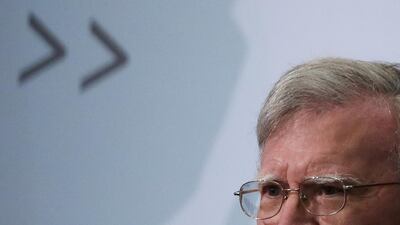US President Donald Trump's former national security adviser John Bolton said on Friday that Twitter Inc had returned control of his personal account to him after it had been taken over by the White House.
"We have now liberated the Twitter account, previously suppressed unfairly in the aftermath of my resignation as National Security Advisor," Mr Bolton told his more than 790,000 followers in his first tweets since resigning in September.
"In full disclosure, the @WhiteHouse never returned access to my Twitter account. Thank you to @twitter for standing by their community standards and rightfully returning control of my account," he wrote.
Mr Bolton did not explain how the White House had blocked his access to the account, but asked in the post if it had been done "out of fear of what I may say?"
Later on Friday, Mr Bolton told reporters at the Union Station in Washington: "We have regained control of the Twitter account. Twitter detached the White House."
A senior administration official told Reuters the White House did not block Mr Bolton from the account "and wouldn't have the technical means to do so."
Twitter declined to comment.
Mr Bolton's return to the platform comes at a sensitive time for the Republican administration. Mr Bolton is among various US officials described as being alarmed at Trump's controversial use of his personal lawyer Rudy Giuliani on Ukraine policy, which is under intense scrutiny in a Democratic-led impeachment inquiry.
Former White House Russia expert Fiona Hill recalled in her testimony at public impeachment hearings on Thursday that Mr Bolton had called Mr Giuliani "a hand grenade who's going to blow everybody up."
Asked if he was prepared to testify at the impeachment hearings, Mr Bolton said: "I have no comment."
Like other White House officials, Mr Bolton was required to relinquish control of his private Twitter account, including the password, to the White House when he became national security adviser in March 2018, said two people familiar with the matter. Both spoke on condition of anonymity.
One of the people, who is close to Mr Bolton, said that several days after Mr Bolton resigned on September 10, the White House was asked to return control of the account.
When no action was taken, according to this person, the request was elevated to John Eisenberg, the top National Security Council lawyer, who responded that the issue was being worked on.
Eventually, with the White House continuing to take no action, Twitter was asked to recover control of the account for Mr Bolton and it did so earlier this week, the person said.
The National Security Council did not immediately reply to a request for Mr Eisenberg to comment.

